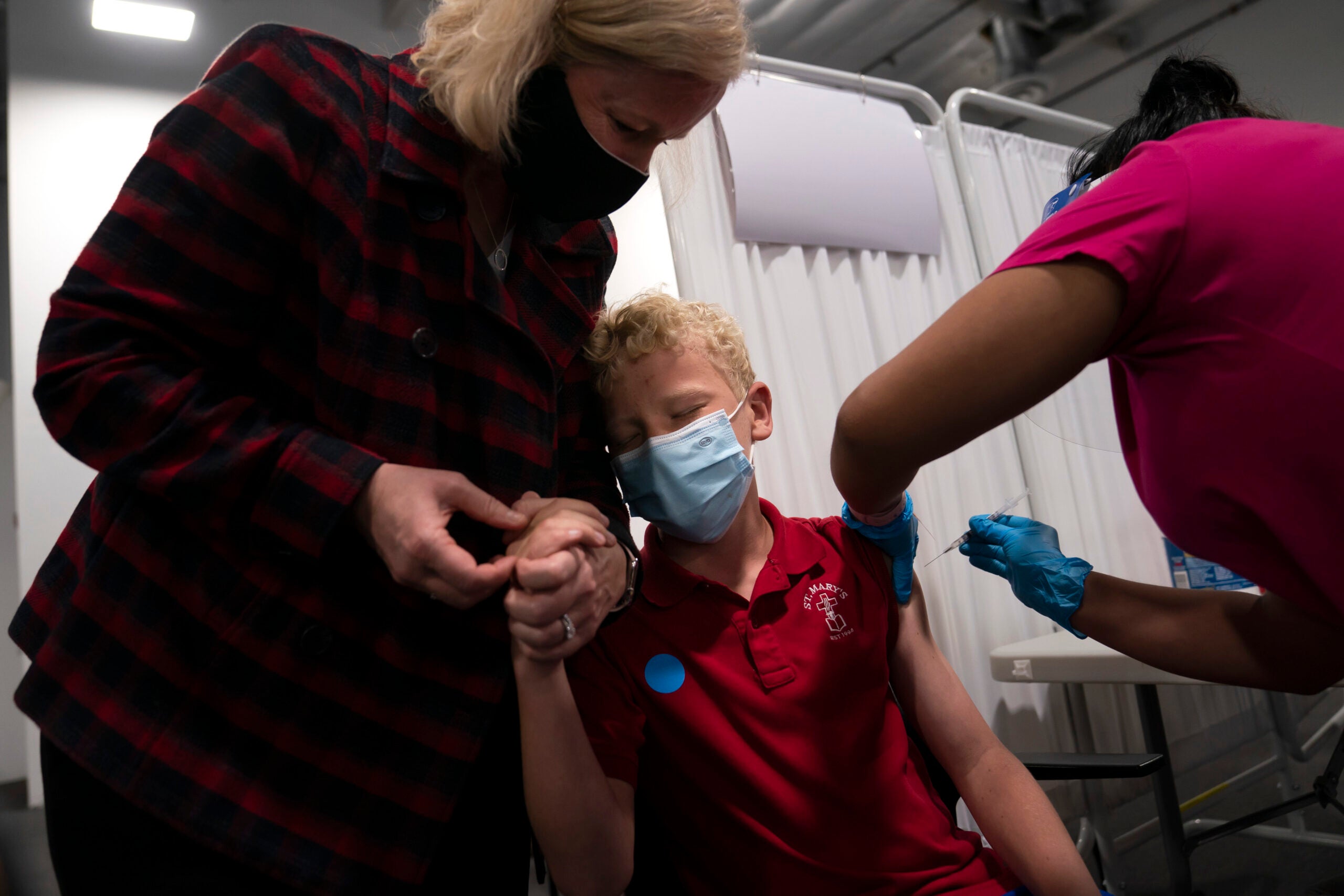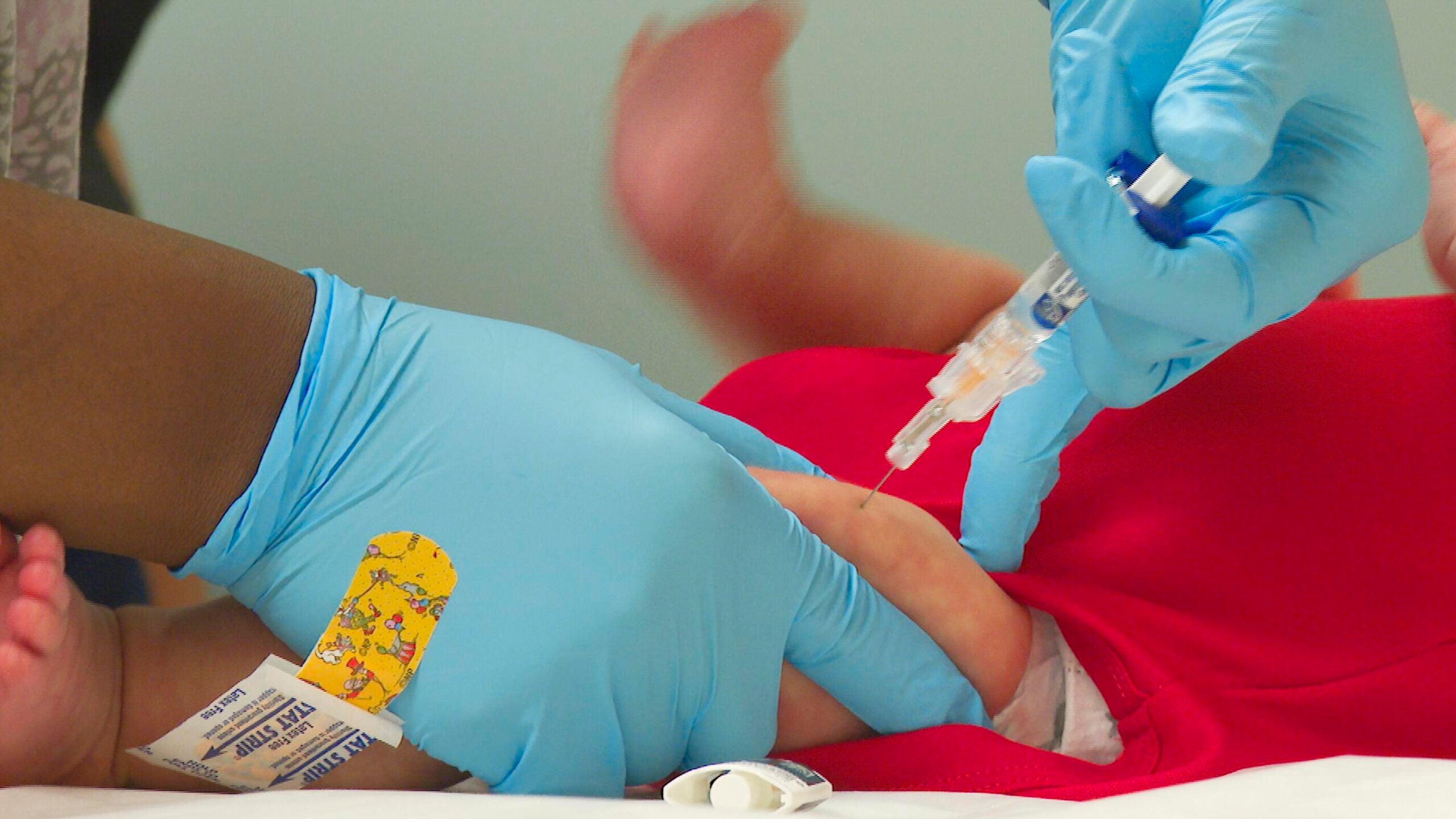Last Thursday, just two days after the Pfizer COVID-19 vaccine cleared one of its last major hurdles on the path to approval for kids ages 5 to 11, Leanna Worrall posted in a Facebook group for people trying to find vaccines to ask where she could get her 7-year-old a shot. She’s one of many Wisconsin parents and guardians who’s trying to get a vaccination plan in place as providers say they could be ready to administer COVID-19 vaccines to kids as early as the end of this week.
Worrall told WPR that getting her son Solomon vaccinated won’t radically change the risks her family is willing to take, since her younger daughter Yael, at 2, is still too young to get the vaccine, but it will bring peace of mind.
“He’s kind of the weakest link in our family in terms of human interaction. He’s the one who sees the most people, he’s the one in the most diverse settings,” she said. “I kinda see his school interactions as the place where we’re most exposed, so it’s going to feel less scary to me.”
News with a little more humanity
WPR’s “Wisconsin Today” newsletter keeps you connected to the state you love without feeling overwhelmed. No paywall. No agenda. No corporate filter.
There are about 500,000 children in Wisconsin who will be newly eligible for the COVID-19 vaccine when it’s approved for 5 to 11-year-olds, according to data from the American Communities Survey.
When will shots be available?
The Centers for Disease Control and Prevention meets Tuesday to decide whether to approve the Pfizer vaccine for younger kids, and whether certain kids should be prioritized to get the shots, like older adults and health care workers were in the early stages of vaccine rollout.
Providers, health departments and other vaccine distributors in Wisconsin say they could have doses that are ready to be administered to younger kids by the end of this week.
Dr. Ben Weston, Milwaukee County’s chief health policy advisor, said in a weekly briefing doses could be available as early as the evening of Nov. 3, though he said Nov. 4 was more likely.
Some providers are already allowing people to schedule their shots, though they’re recommending dates next week to make sure they have enough time after the CDC and the state Department of Health Services finalize guidance to get the child doses ready to go.
Worrall signed Solomon up for his first dose at Hayat Pharmacy in Milwaukee, which is recommending people register their kids for shots beginning Nov. 13. She then saw his school district, Middleton-Cross Plains, was opening up vaccine clinics with appointments that were closer to home, and signed him up there.
Shannon Valladolid, head of communications at the Middleton-Cross Plains Area School District, said the district decided to set up vaccine clinics after a survey of parents and guardians showed a strong interest. The district worked with SSM Health to set up 69 first-dose vaccination slots beginning Nov. 11, with second doses scheduled for December.
“We sent out communication last week to families for them to be able to sign up,” she said. “Almost instantly, we had all of the slots fill up.”
For families that can’t or don’t want to schedule an appointment, many currently operating vaccination sites that are set up for walk-in patients will also allow walk-in vaccination for kids once the doses are available for ages 5 to 11. In Marathon County, for example, the health department is extending hours and adding Saturdays to its Northcentral Technical College clinic in November in anticipation of high demand for child vaccines and booster shots. Rock County’s health department is also extending hours.
“Once it’s approved, any person from the age of 5 up can go get vaccinated at NTC, which is great,” said Aaron Ruff, public information officer at Marathon County Public Health.
What is the risk of COVID-19 to kids?
In Wisconsin, children currently have the highest rates of new COVID-19 cases, especially among kids ages 4 to 8 and 9 to 13, who mostly fall in the soon-to-be eligible group.
Even though children are less likely to get severely ill or die from COVID-19, it’s still deadlier than the flu. In Wisconsin, the late summer also saw an unusual surge in other respiratory diseases among kids, which put a strain on the medical resources needed to care for kids who do get severe COVID-19.
Children with underlying conditions like autoimmune disorders or severe asthma are at higher risk for a severe case of COVID-19.
What are the vaccines like?
The Pfizer vaccine for kids is a two-dose series, just like it is for adults.
The shots have one-third the dose of shots for adults and older children, and will have a special orange cap, so vaccination sites won’t mix up the doses.
Are there other considerations for kids?
Many of the providers who are planning to vaccinate younger kids noted that children, especially younger children, don’t always have the easiest time with shots.
In Milwaukee County, health commissioner Kirsten Johnson said they’re looking to partner more with schools to set up smaller clinics in more familiar places like elementary schools, and encouraging families to get shots through their primary care physician if they have one.
“It’s unlikely that we will have a mass vaccine clinic, primarily because we just don’t think it’s an appropriate setting for kids,” she said.
Worrall said she’s bracing for that with Solomon. She said he’s incredibly excited to get the vaccine because of the ways it will make school, in-person play dates, guitar lessons and soccer safer. However, when it comes to the moment he sees the needle, she’s expecting a bit of a fight-or-flight response — like he had for his flu shot this year, which he was also excited about beforehand.
“I was like, ‘Oh, are we finally over the hump of being afraid of needles?’” she said. “No, we were not over the hump. He screamed the place down.”
Wisconsin Public Radio, © Copyright 2025, Board of Regents of the University of Wisconsin System and Wisconsin Educational Communications Board.






